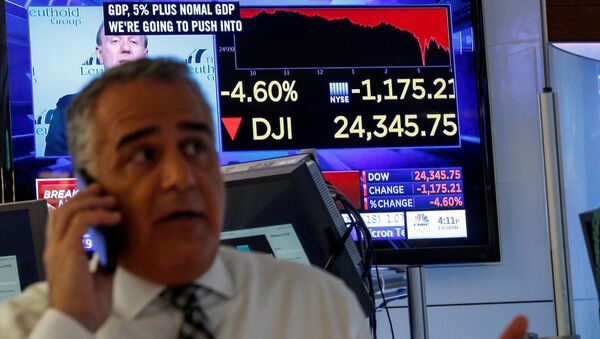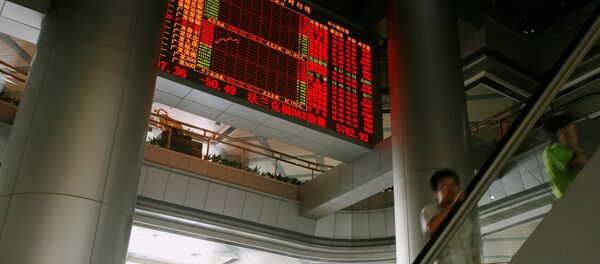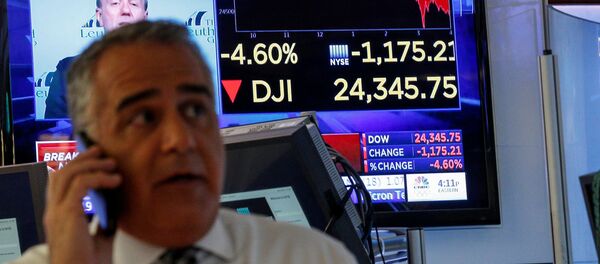For instance, Joe Scarborough, the co-host of the popular “Morning Joe” show on MSBC blamed Donald Trump’s tax reform for the stock market volatility. “You don’t cut taxes when you have full employment. You don’t cut taxes when the economy is doing well. You don’t overheat the economy,” he said.
“Well Republicans didn’t listen, Donald Trump didn’t listen and guess what? The market’s collapsing now and it’s collapsing because what are people afraid of, high-interest rates, because the economy can be overheated, it’s unbelievable…. What is dangerous is you allow the debt to continue to go up.”
There are two problems with this line of thinking. First, the issue of the US federal debt is an old one, and it can be traced back to President Bush. Moreover, Barack Obama, the darling of the mainstream media, consciously exacerbated the problem. It's not a matter of opinion; it is a matter of fact. Under Obama the federal debt went from $10.626 trillion to $19.947 trillion. On a dollar basis, Obama's debt increase is by far the largest in American and world history. Blaming Trump for America's debt issues is more than a bit disingenuous.
The US debt is not Trump's fault. It is a bi-partisan problem, that none of the mainstream American politicians, including Trump, is willing to address, because reducing the debt means reducing the government handouts and cutting the profits of the insatiable military industrial complex.
READ MORE: Rises in Dow Jones Are as Crazy as Rises in Bitcoin — Author
The second problem with the accusations hurled at Trump is that his tax plan has received an overwhelmingly positive reaction from Wall Street, and it is hard to see any reason why the same tax plan should now be considered the main reason for the recent market slump. There are other, more plausible reasons for the sell-off.
It’s the computers’ fault. Or is it?
While some market participants get very angry when journalists mention the role of the so-called "quant funds" (also known as "algorithmic funds") in the recent market volatility, there is no denying that computerized automated trading has become a key element of the US stock market. Some of the trading algorithms deployed by financial behemoths like Two Sigma or AQR Capital issue buy and sell orders worth tens of millions of dollars without any regard to the fundamentals of a given stock or bond, because those algorithms care only about the price action, often buying something simply because its price is going up, or selling because it's going down. Even if such algorithms lack the emotional vulnerabilities of human traders, they can and do exhibit herd-like behavior that resembles the good old-fashioned market panics of the past century.
Interestingly, when computers buy stocks simultaneously no one is complaining, but when computers sell simultaneously the public is outraged. Like it or not, computer-driven strategies were involved in the US stock market uptrend and they will be involved in any future downtrends as well. “Quant funds (CTAs and Risk Parity funds running vol control) have likely contributed to the equity selling in one of the largest deleverings in our models’ history, but their impact should dissipate quickly from here,” Bank of America Merrill Lynch’s global equity-derivatives research team wrote in a Tuesday note quoted by Bloomberg. Computer-driven buying and selling is working like an accelerant, magnifying the price moves caused by external factors. So, while computers were "complicit" in the recent market turbulence, the source of the turbulence is somewhere else.
The scary bond market
That's exactly what happened last week. The US bond market mood switched from supportive to intimidating, resulting in a swift drop in equity prices. Recent reports on inflation and the bi-partisan spending deal, that greatly increases the US budget deficit, stoked fear that the new chair of the Federal Reserve will have to raise rates, and do it sooner rather than later. The bond market reacted negatively, dragging the stock market lower. To some market players, like billionaire Ray Dalio who runs one of the biggest hedge funds in the world Bridgewater Associates, it looks like the bond market is signaling a future recession.
"The risks of a recession in the next 18-24 months are rising," he wrote in a LinkedIn post, adding that "it seems to be inappropriate oversight to not be talking about the chances of a recession and what that recession might look like prior to the next election."
So, who is to blame for the stock market plunge? It doesn't really matter. The actual list of culprits is too long because it includes politicians from both parties, Federal Reserve chairmen, economists and bankers. It took them almost a decade to inflate the greatest bond and stock market bubble ever created. It will pop, and its implosion is only a question of time. Maybe, the current market correction will be reversed soon but it could also turn in a full-blown bear market. Again, it doesn't really matter because no bubble can last forever.
Interestingly, Donald Trump knows that the US stock market is in a bubble, but there are few things he can do about it. During his presidential campaign he said: "Believe me, we are in a bubble right now, and the only thing that looks good is the stock market, but if you raise interest rates even a little bit, that's going to come crashing down. We are in a big, fat, ugly bubble."
READ MORE: Dow Jones Plunges More Than 1,000 Points — Is a Recession Beginning?
He was right. The interest rates are rising and the market is going down. The irony is that the media will certainly blame Trump for the eventual market crash, hoping that his base will desert him, handing the White House back to a Democrat or a Republican candidate approved by the deep state. What can the US president do about it? Nothing, except trying to postpone the market crash until after the next presidential election. Maybe Trump can pull it off, despite the fact that the deck is stacked against him. However, even Trump can't deflate the stock market bubble without a crash. The economic price for a decade of budgetary and monetary excess perpetrated by the American establishment will have to be paid sooner or later.
The views and opinions expressed by Ivan Danilov are those of the author and do not necessarily reflect those of Sputnik.





